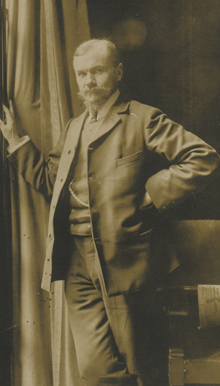Frederik van Eeden > Frederik van Eeden: the idealist
At first, Frederik van Eeden expressed his social involvement by practicing the profession he had been schooled in: medicine. The dissertation he wrote for his degree dealt with artificial feeding as a way of fighting tuberculosis, public-health enemy number one at the time. He also specialized in psychiatry. In 1887, in cooperation with A.W. van Renterghem, he opened a psychiatric clinic in Amsterdam. In treating his patients, Van Eeden used new methods, such as psychotherapy and hypnotic suggestion. Van Eeden closed his psychiatric practice, however, in 1893, a year in which he, moreover, had a conflict with De Nieuwe Gids and retired from its editorial staff.
Anticapitalism
In search of a new spiritual meaning of life, Frederik Van Eede next immersed himself in philosophical subjects and social issues. His ideas evolved in the direction of anticapitalism, though he never actually joined a socialist movement: he had greater faith in gradual reforms than in revolution and placed spiritual values above Marxian materialism. Inspired by the American writer Henry David Thoreau, whose magnum opus Walden or Life in the Woods (1854) greatly influenced him, Van Eeden and a number of kindred spirits founded the Walden colony near Bussum in 1898.
Forte-Kreis
Although Van Eeden had many followers, he was also often ridiculed by the sober-minded Dutch. Outside his native country, he met with more sympathy, allowing him to build up an international network of contacts. In 1914, he took the initiative to found a Dutch version of the German Forte-Kreis, an association uniting people of ‘royal spirit' for the furtherance of world peace. Among those whom Van Eeden succeeded to interest in the Forte-Kreis were the writers Erich Gutkind, Romain Rolland and Upton Sinclair, the psychotherapist Poul Bjerre, the philosopher-theologist Martin Buber and the politician Walther Rathenau. But then the First World War broke out, differences of opinion emerged and the group never achieved anything substantial in the Netherlands.
<< Back | Learn more about Frederik van Eeden: the philosopher and spiritualist >>

